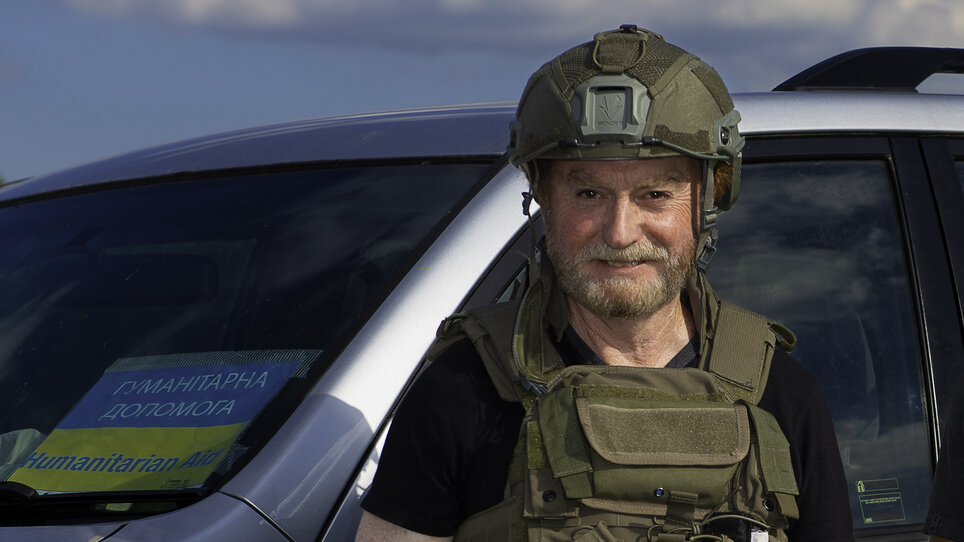The Autism Ukraine Project

David Higgs MBE writes about delivering anxiety-reducing aid to autistic Ukrainians – and the heroes he met along the way.
There are estimated to be half a million autistic people living in Ukraine. Many are actively supporting their country’s resistance to Putin’s invasion, even fighting or supporting soldiers on the frontlines. In early June 2024, after 14 months of research and engagement with Ukraine’s autistic community, the Autism Ukraine Project set off from the UK to drive the length and breadth of the country to meet some of these extraordinary autistic Ukrainians.
The project’s aims were threefold:
- to challenge the stereotypical preconceptions, discrimination and stigma often associated with autism by highlighting amazing autistic people, ensuring they were no longer ‘invisible’, and allowing them to tell their stories in their own way, to give them a voice
- to bring much-needed emergency relief and comfort to autistic people in a war zone who are struggling with sensory issues and anxiety
- to give moral support and express UK solidarity with autistic residents across Ukraine.
“For autistic people hypersensitive to sound… living in a war zone is utterly traumatic”
The project’s intention was to meet and interview a selection of autistic individuals and groups who embodied the main themes of this project: courage, resilience, determination and creativity. By allowing autistic people to tell their stories, we wanted to present a less ‘pathologised’ and more positive and balanced portrait of autism.
We also wanted to document the experiences of autistic people who are suffering as they resist Russia’s attacks against themselves and other civilians living in this beautiful country. I’m autistic myself and was motivated to launch the project based on my own experience of sensory and social overload.
Research conducted recently in the UK suggests that, even in peacetime, autistic people may be eight to nine times more likely to suffer from post-traumatic stress disorder than the general population. This is important if we are to measure the true cost of armed conflict on the health of a nation.
We drove more than 8,000km through Ukraine, averaging nearly 450km per day. Over 18 gruelling days, with the cooperation and guidance of the autism organisations Child with Future and Ask an Autistic, the project was able to deliver emergency aid to autistic communities, including children and adults, at centres in Kyiv, Irpin, Pavlograd, Kharkiv and Zaporizhzhia. This included the distribution of ear defenders and ‘snuggle’ toys that help reduce anxiety and improve sleep. In situations where there was a language barrier, we used autistic interpreters wherever possible.
Sadly, Irpin has become synonymous with some of the worst atrocities committed by Putin’s forces when, in March 2022, the town was briefly occupied by invading troops as they attempted to attack the capital, Kyiv, 12 miles away. Perhaps no wonder then that, when we visited children at the Dyvosvit Centre, Irpin, some were moved to tears on receiving these unexpected gifts.
For autistic people hypersensitive to sound, enduring the nerve-rending cacophony of bombardment by shelling, rockets, glide bombs and kamikaze drones means living in a war zone is utterly traumatic. Repeated attacks on Ukraine’s energy infrastructure mean that sustained power cuts are routine. This means noise-cancelling headphones that require regular charging are not an option. In such circumstances, simple ear defenders are a godsend.
Above all, we hope the Autism Ukraine Project was able to give moral support and demonstrate solidarity with autistic residents across Ukraine. In these tumultuous times, the world has a greater need than ever for people who think differently to be seen and their voices heard. The Autism Ukraine Project’s next major challenge is to turn hours of video and audio
recorded in Ukraine into a documentary that truly reflects the depth, wisdom and compassion exhibited by autistic people.
This article originally appeared in Your Autism, our magazine for members. To find out more about membership, visit here.

